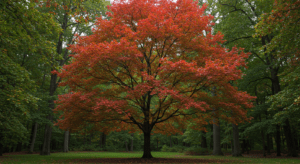 A groundbreaking study by researchers from MIT and Harvard has revealed that urban trees, often used as models to predict forest responses to climate change, may be offering a misleading picture. Focusing on red oaks in urban heat islands like Cambridge, Massachusetts, the researchers discovered these city-dwelling trees possess significantly lower genetic diversity compared to their rural counterparts in places such as Harvard Forest.
A groundbreaking study by researchers from MIT and Harvard has revealed that urban trees, often used as models to predict forest responses to climate change, may be offering a misleading picture. Focusing on red oaks in urban heat islands like Cambridge, Massachusetts, the researchers discovered these city-dwelling trees possess significantly lower genetic diversity compared to their rural counterparts in places such as Harvard Forest.
This genetic uniformity renders them less resilient and less representative of the broader species’ capacity to respond to environmental stressors, particularly extreme heat. As a result, the apparent robustness and adaptability of urban trees may paint an overly optimistic portrait of how climate change will impact forests at large.
The study warns that relying on these urban indicators could distort our understanding of ecological vulnerabilities, leading to flawed forecasts and ineffective conservation strategies. To combat this, the scientists urge future climate research to integrate genetic analysis, allowing for a more nuanced and accurate assessment of how tree populations across diverse environments will truly respond to the accelerating climate crisis.
Source: Earth.Com
